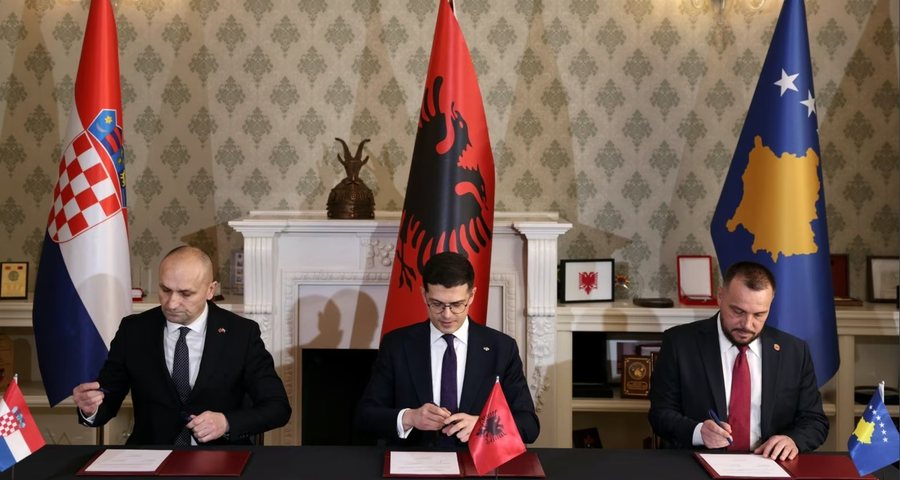
Exploring the development and acquisition of defense capabilities through multinational cooperation, sharing best practices in recruiting, developing, and retaining personnel to enhance deterrence and defense capabilities, joint exercises, strengthening countermeasures against hybrid threats, sharing intelligence for deterrence, and supporting Kosovo in obtaining its status in NATO's Partnership for Peace.
These are some of the points included in the declaration of cooperation in the field of defense and security that the Defense Ministers of Kosovo, Albania and Croatia signed on March 18 in Tirana.
The full agreement was published by Albania's Defense Minister, Pirro Vengu, on March 22, who wrote in X that in its history, Tirana has no precedent for secret agreements or treaties to the detriment of its neighbors, "as other states have had."
"Serbia, having pursued an empty-chair policy in regional initiatives for two years, has unilaterally suspended itself from the opportunity to promote or participate in multilateral consultations. This suspension, which it is up to Serbia to set aside, renders futile any victimization narrative coming from the Serbian government," he wrote.
The full text of the statement was later published by the Kosovo Ministry of Defense.
Minister Vengu said that the agreement aims to fulfill the ambitions arising from NATO's strategic concept and relies on increasing cooperation and industrial defense production based on the alliance's commitment to industrial expansion and the European Union's plan for the Rearmament of Europe.
What does the statement say?
The agreement on the field of security and defense between Kosovo and two NATO member states, Albania and Croatia, has four points.
The first point concerns the promotion of defense capabilities and cooperation in the relevant industry.
It states that the three countries will explore the development and acquisition of defense capabilities through multinational cooperation, in order to increase the readiness of their military forces. Kosovo, Albania and Croatia also pledge to identify areas for cooperation in the defense industry, promoting access to resources and supply chains in order to have a competitive and sustainable defense industry.
This point of the agreement also foresees investment in new technologies and innovations in order to have a unified approach to the transformation of security and defense.
The second point addresses increasing interoperability, through education, training and exercises. It states that best practices in recruiting, developing and retaining qualified military personnel will be shared in order to increase preventive and defensive capabilities.
It also foresees the possibility of individual education and training through the respective academies and colleges of the states, "in order to have a better strategic understanding of common threats and challenges."
The agreement foresees bilateral and trilateral exercises to improve interoperability based on NATO and EU policies, in order for their military forces to be adequately prepared.
Point three focuses on countering hybrid threats. States have pledged to strengthen joint steps to respond to hybrid threats, including cyber threats, disinformation campaigns, and “malign foreign influence that could compromise or affect national and regional security.”
This area includes the exchange of intelligence information for strategic and operational coordination between defense institutions "to prevent, detect and respond effectively against the challenges facing our respective countries."
Likewise, Kosovo, Albania and Croatia have said they will explore options for responding to a range of potential threats to their critical infrastructure.
And the last point of the agreement talks about the support that the states will provide for Euro-Atlantic integration. This includes the alignment of policies with Euro-Atlantic security and defense institutions and structures.
The states have pledged to cooperate for the full integration of Kosovo into regional security and defense initiatives as well as its accession to NATO's Partnership for Peace Program.
Serbia's criticism of the agreement
Serbia has criticized the cooperation initiative between the three countries, seeing it as a threat to its "terrorist integrity." Belgrade, which immediately demanded an explanation from Zagreb and Tirana about the goals of the initiative, has also accused the two countries of starting an arms race in the region.
Kosovo, meanwhile, has said that the cooperation initiative will contribute to peace and stability in the region and should not be seen as a threat to anyone, but should also be taken as a message that the three states will be united in the face of any challenge or threat.
The Kosovo Ministry of Foreign Affairs and Diaspora has described Serbia's objections to the defense cooperation initiative as a "blatant violation of the Brussels Agreements", which, according to the MFA, "clearly stipulates that Serbia will not hinder Kosovo's international relations and will not claim to speak on behalf of Kosovo in relations with other states and organizations".
"Serbia's attempt to present itself as a 'guarantor of peace in the Balkans' is absurd. No state in the region and beyond has contributed more to the destabilization of the Western Balkans than Serbia, as historical facts and recent developments prove," the MFA said on March 19.
Croatia has responded to Serbia's criticism, saying that the time has passed when Zagreb sought permission from Belgrade on how to act and with whom to cooperate.
The Defense Ministers of Kosovo, Albania, and Croatia have said that the initiative could be expanded to other countries, mentioning the possibility of Bulgaria becoming part of it.
Meanwhile, Montenegro has said that it was not invited to become part of the declaration on cooperation in the field of security and defense.
Security experts have seen the initiative as a step towards strengthening alternatives or strategic alliances, so that Kosovo can advance in terms of defense. However, they do not see it as a step towards the formation of a formal defense alliance, such as NATO. REL
(A2 Televizion)











